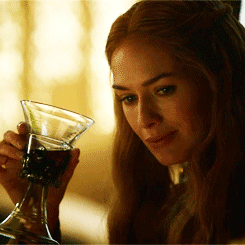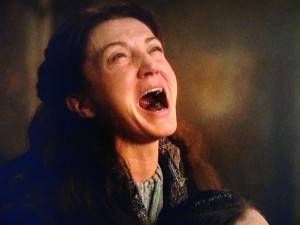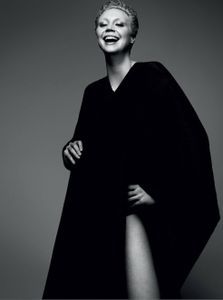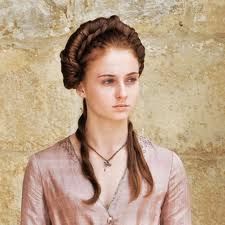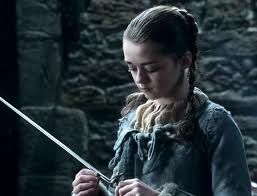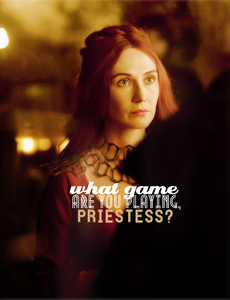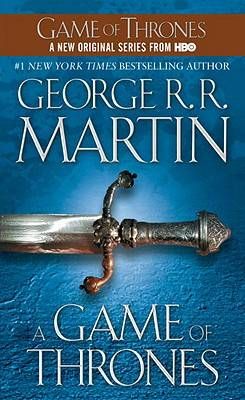
A Song of Ice and Ire: Feminism and the World of GAME OF THRONES
Spoilers and trigger warnings ahead.
An Overview
I’ve reached a point that many fans of A Song of Ice and Fire reached years ago: I’ve read all the books and am waiting. Like fans of the show, I’m waiting. Since I have no more new material from Martin or HBO to dive into, all I have left is the thinking and studying part, which naturally must follow the reading and watching, especially when your social network includes professors from your graduate program.
When Game of Thrones premiered, I had heard of the books in passing but (sadly) had dismissed them because I didn’t, at the time, want to commit myself to thousands of pages of a series that hadn’t yet been completed. I was hesitant to start watching something without having read the books first, especially having watched (and been burned by) True Blood, also based on a book series, this one written by the nicest lady you’ve ever met who isn’t your aunt (I would know; I got to have dinner with her a few years ago!) But I gave it a go. Like other viewers who define themselves as feminists, I was appalled by the sexual violence in the first few episodes of the show. Still, I suspected, because I saw what happened to True Blood, that HBO was probably to blame for that more than Martin himself. That’s partly correct: HBO does get away with more than other networks for obvious reasons, and they do sometimes flail a bit when trying to find an audience, so as a series gets its feet under it, some episodes skew sort of, “MORE BOOBS. WHO DOESN’T LIKE BOOBS, AMIRITE?” So there’s that to keep in mind. Sometimes the written word offends less because we have control over the images it conjures. We can skip over lines and paragraphs willy-nilly and shield ourselves from whatever we don’t want to imagine.
Fiction hopes to take us out of our world and firmly transplant us in another. Many of us read with that hope in mind. Not always escapist, fiction also makes us look at our world in relation to those we visit within the pages of books. And fantasy lit has even more freedom because it can go wildly beyond the limits of the natural world to create anything it pleases. That’s what I love most, I think, about A Song of Ice and Fire: the seamless, natural blending of real and unreal.
Martin’s world is without a doubt brutal. It is unforgiving. Its weather patterns are crazy and nature is full of threats, which often take the form of supernatural creatures. Winters are almost impossible to survive and often last for years. Claims to the Iron Throne are heavily disputed, and the wars seem never-ending. Men vying for the crown are murdered and tortured. Men in the way of those vying for the crown are murdered and tortured. In addition to the threat of murder and torture, women in this roughly-Medieval world are subjected to threats of rape, completed acts of sexual assault, and domestic violence. They are slut-shamed, they are objectified, they are disregarded. Two of the prominent male characters (which, you knew there were going to be spoilers), Tyrion Lannister and Theon Greyjoy, are also victimized in sexual ways by the men who hold power over them. I’m so glad these things don’t happen here in 21st-century reality. (Wait.)
As a feminist, I’ve found it hard to enjoy Game of Thrones publicly at times. “What about all the rape? The gratuitous nudity?” Part of life in Martin’s world, friends. Just like it’s part of life in ours. All the brutality we don’t associate with how we live contrasts sharply with how things really are just below the surface. We live in a world in which: eight-year-old girls wear makeup and suggestive clothing; rape victims hesitate to report the crime because they don’t want to relive it in the courtroom, essentially feeling as though they themselves are on trial; women’s rights, pay, and power are not equal to men’s; girls are taught not to get raped, rather than boys being taught not to rape, but also to be pretty objects of male sexual desire. I don’t want to get political, as feminism is not a strictly political mindset, but we live in a society that is broken. And I haven’t even touched on race or sexual orientation.
There are plenty of other things to hate about Martin’s world: murder, torture, animal cruelty, theft, robbery, adultery, slavery. A host of other sins generally accepted as Wrong Things to Do. All the talk about rape and domestic violence, in my view, comes to the forefront because our society too-often takes a wishy-washy view of those crimes; the “she was asking for it,” “she provoked him,” or “he was too weak to fight it off” dismissals are too commonly accepted. To see the same attitudes in a world far distant in time and living conditions from our own is a harsh wake-up call: our world kind of still sucks in a lot of the same ways.
The Women
To automatically categorize a work as patently “feminist” or “not feminist” or even “woman-hating” is absurd, particularly if you’re judging thousands of pages by a season or so of the work’s HBO adaptation. With the BBC, maybe that would be possible. Maybe. Not with HBO.
Surely there’s space in our brains and lives for nuance when we look at the women Martin has created. Surely we can still process information and events that don’t come neatly labeled. Surely we don’t hold fiction responsible for being, or authors responsible for creating, a trigger-free space. Last one: Surely we don’t still believe that high fantasy is just for men and boys, even when written by a man.
To write off Martin’s female characters is, to this reader, lazy and silly. His greatest exemplars of chivalry and religion (realms almost always dominated by men) are both women. Over the course of the five books that are out, we meet all kinds of women in between: women of color (Arianne Martell, Alayaya, Chataya), strong women, weak women; the exemplary, the flawed, the villainous, and the ambiguous. In that regard, Martin’s books have less of a feminism problem than (I’ll say it) Lord of the Rings or Harry Potter, simply because he does include women who would (unlike Galadriel) take the damned ring and use it to rule; who would not (unlike Hermione or Ginny) content themselves with being a sidekick or a prize for the hero. By creating all kinds of women, Martin asserts that flawed female characters are just as important as the paragons of lady righteousness we’re used to in much of fantasy lit. True in fiction, true in life. As for the vitriol directed toward his scenes that depict sex or sexual violence, well, it’s as if we’ve forgotten (which does happen) the simple fact that inclusion of events in one’s story does not equal endorsement of the same events in real life. It doesn’t mean, as one vocal critic asserted at the start of the series, that Martin is some kind of pervert for including rape and incest in A Song of Ice and Fire; it simply means that his story takes place during a time that is roughly analogous to our Medieval Period, and that time in history is not exactly known for being all unicorns and rainbows. It was pretty horrible, actually, just hell and brutality as far as the eye could see. Well, and great literature.
That digression, I hope, serves to set up the world in which all these women exist, a fictional world that has its roots in our own history, a history that would be inaccurately represented without the inclusion of the shitty things that happened to both men and women, and that wouldn’t be fictional if said shitty things weren’t exaggerated to create the brutal environment that lends itself to the type of tale Martin wanted to tell.
Without further blah-do, I give you (in the order they popped into my head) my take on the main cast of lady characters in GRRM’s world, all of whom I love in different ways.
Cersei Lannister would take the damned ring. She frequently laments the fact that being born a woman in Westeros limits her power. She believes that she, above her brothers, has learned more from and has more in common with their brutal, brilliant father, Tywin, who is all about preserving the appearance of his family. Cersei is in a consensual sexual relationship with her brother, and that union, not the one with her husband, produces her sons, Joffrey and Tommen, each of which serves as an underage king, allowing her to rule in their stead as Queen Regent. Cersei refuses to be married off a second time. She does everything in power to undermine the new queen, Margaery Tyrell, who is married first to Joffrey then to Tommen (well, first to Renly Baratheon, a truer heir to the Iron Throne than Cersei’s sons). Cersei fails to outsmart Margaery, however, because Margaery has learned from the best how to be cunning (just watch Diana Rigg as Lady Olenna to get the full effect of the Tyrells’ take on lady badassery). Cersei is not as smart as she thinks she is. She’s short-sighted and selfish. These are the qualities that make you love to hate her. But her outspoken challenging of the patriarchal society in which she lives makes you respect her.
Catelyn Stark is a matriarch. After her husband’s wrongful beheading, she sets into motion a series of events that makes everything worse, yes, but she is not (as some assert) responsible for her son’s death. He “marries for love” instead of following through on the smart political move Catelyn has made by promising him to a Frey daughter, thus setting up his own demise at the hands of awful, awful Walder Frey. Catelyn gets an unfair amount of shade thrown at her for always thinking about her children, but she is legitimately concerned for their well-being, just wants her family (or what remains of it) back together, wants Robb to take his rightful (according to the people) place as King in the North. Tywin Lannister, our other example of Head of Household, doesn’t even bother playing at caring for his children; he cares for the reputation of the Lannister family. Catelyn dies brutally for what her son did unbeknownst to her; Tywin dies brutally at the hands of his mistreated dwarf son—who cannot be proven otherwise—because he never lets Tyrion forget that he doesn’t fit the Lannister mold.
Daenerys Targaryen is victimized by her brother and sold into marriage to savage Dothraki warlord, Khal Drogo. Their relationship is one of the major things that the first season of the show got wrong. Yes, the marriage-consummation custom skews to the non-consensual. Yes, many of the men in the series regard their new wives as property. BUT. Khal Drogo picks up on Dany’s fear and hesitation and works to create a pleasurable environment for her before the consummation. The terms of her consent are not explicitly laid out, nor are they in many realistic sexual relationships, but Drogo takes his time and Daenerys feels good by the time she says yes. Now, let it be known that I’m not one for the notion of “gray rape,” and God knows I’d never want to perpetuate it; still, I have to admit that in Dany’s case (IN THE BOOK, I reiterate), I will argue that the reader’s sexual style or preferences might color interpretations of this scene. But I shan’t be telling you anything about my own, so I’ll stop there. We’re leaving out age because in the actual Medieval Era, thirteen-year-old girls were married off and expected to bear children. Not saying it’s right, and neither is GRRM, but it happened. Dany’s rough equivalent to imperialization is another Thing That Happens and has drawn controversy; Martin doesn’t include it because he condones it but because it’s a Thing We Talk About When We Talk About History. And anyway, a young, flawed Khaleesi in the east is just as important as a young, flawed King in the North. More so because she has dragons and isn’t dead yet?
Brienne of Tarth. Oh, Ser Brienne. I wish there were a more feminine-sounding chivalric title with which to address you, but you probably wouldn’t want me to use it anyway. Brienne is the closest thing we have, really, to a paragon . . . but she’s a paragon of the chivalric code, the best knight anyone has ever met, even Ser Jaime Effing Lannister, whose reputation takes a hit when he kills Mad King Aerys Targaryen (think Lord Denethor but even more screwed up). She’s ugly, though probably not as ugly as she thinks; she’s bigger than a lot of men; she’s awkward and introspective and always acts honorably. Men give her a hard time about her looks, but I rather suspect this happens more because she refuses to conform to standards and fit their narrow view of what a woman should be and look like. Brienne’s lack of moral ambiguity makes her lovable but it also makes her less compelling than some of the more conflicted characters.
Sansa Stark is, to me, unreasonably hated by readers and viewers, or, if not hated, then wrongly disregarded. Throughout the first book, we see that she has dreamed of being a princess, of being queen, but only because she wants the life in the songs and stories. She wants to wear pretty dresses and eat lemon cakes and be adored. Betrothed to Joffrey, she sees the possibility that those things will actually make up her life. Of course, when Joffrey has her father, Ned, beheaded for treason (despite an arrangement that would have allowed Ned to go to the Wall instead), Sansa’s dreams turn nightmarish in a hurry. Even after their betrothal ends and she weds his Uncle Tyrion, Joffrey doesn’t stop tormenting her. Near the end of the third book, Littlefinger helps Sansa escape. She adopts the identity of his bastard daughter, dyes her hair, and goes to the Eyrie, where she is betrothed (upon Tyrion’s seemingly inevitable death after he slays Tywin) to her young cousin Robert Arryn. My theory is that, since Sansa has always been so good at keeping her outward behavior from matching her inner reality, she will learn Littlefinger’s game well enough to beat him at it and finally free herself. She’s much smarter than anyone gives her credit for, frequently (and rightly for her situation) reminding herself that, “Courtesy is a lady’s armor.” I LOVE HER.
Arya Stark is all action and very little thought. She runs away from King’s Landing after Ned is beheaded because her life is in danger, too, now that Joffrey has tasted power and she isn’t betrothed to anyone. She has learned to use a sword, her wits, and her sometimes ill-advised bravery to survive while posing as a boy. She joins this and that ragtag band, ultimately taking a ship to Braavos, the city of badasses, to train as a Faceless Man (read: super awesome assassin).
Melisandre, a priestess of R’hllor, is the primary religious figure in the book. Lots of male characters dismiss her as a witch or a poseur; most want to bed her because she is devastatingly beautiful (played by Carice van Houten) as well as immensely powerful. I’m not sure yet what her ultimate role will be, but since she’s been at the Wall and That Thing happened to Jon Snow, I have a feeling we’ll be hearing more from her as, I’m hoping, a POV character in book six and/or seven. Of all the religions and gods in Martin’s whole world, hers seems to be the only one getting anything done, through both Melisandre and the priest Thoros of Myr. Now, whether she turns out to be some kind of super-talented sorceress remains to be seen. I HOPE SO. But I also hope not because I want all the stuff she’s said about the Red God to be true for her sake, so she’ll be taken more seriously.
Asha Greyjoy‘s story is just beginning. She’s fierce, strong, and smart; she’d make an excellent ruler. Arianne Martell, from Dorne (the one place, I think, where women can inherit property and rule), makes a political plan that falls through in a really gruesome, ugly manner. Meera Reed and Osha the Wildling help keep Bran and Rickon Stark alive. And Ygritte, another Wildling, with whom Jon Snow breaks his Night’s Watch vow of celibacy. And Lady Olenna. And Lysa Arryn. I really could go on and on about how wonderful and nuanced Martin’s female characters are, even the ones I don’t like. The male ones, too.
I know everyone agrees wholeheartedly with me on this issue, right? No? Fire away. I might not jump in, but I know others will.
_________________________
Sign up for our newsletter to have the best of Book Riot delivered straight to your inbox every two weeks. No spam. We promise.
To keep up with Book Riot on a daily basis, follow us on Twitter, like us on Facebook, , and subscribe to the Book Riot podcast in iTunes or via RSS. So much bookish goodness–all day, every day.



